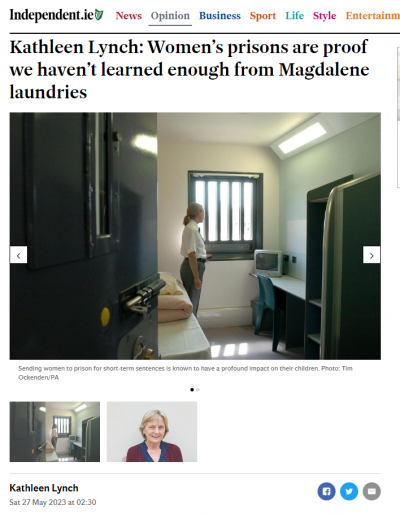Independent: Kathleen Lynch - Women’s prisons are proof we haven’t learned enough from Magdalene laundries
27th May 2023
The piece was originally published in the Independent on Saturday 27 May 2023 and is available via Independent.ie here.
Below is the opinion piece from Professor Kathleen Lynch in response to IPRT's report Progress in the Penal System (PIPS) - a framework for penal reform (2022) which comments on overcrowding and lack of supports in women's prisons. Kathleen is a member of the IPRT PIPS Advisory Group.

We look back in shame at how Magdalene laundries and psychiatric institutions were used by Irish families to hide their unwanted, including thousands of girls and women, for much of the 20th century.
Fast-forward to the 21st century and we find that prisons have become an accepted place of incarceration for the most vulnerable women in Irish society.
This week saw the release of the Irish Penal Reform Trust’s (IPRT) Progress in the Penal System report, which indicated that the imprisonment of women (and men) has grown significantly over the past 20 years.
There were 65pc more women in prison in 2022 than in 2002, and 28pc more men. The general population increase over that time does not warrant such a surge in Irish incarceration rates.
Imprisonment – a punishment for poor health and trauma?
The majority of women imprisoned in Ireland share a similar profile to most male prisoners. They are born into poverty, lacking in educational attainment, suffering from addiction and homelessness. They tend to have mental health difficulties, a disability or both.
However, there are some significant differences.
Women committed to prison are more deprived than men in key health indicators, particularly when it comes to the previous trauma they have experienced.
About 85pc of women committed to prison have addiction issues compared with 50pc to 60pc of men. More than twice as many women as men in prison have a mental illness (60pc compared to 27pc).
As the Mental Health Commission noted in 2021, such high levels of addiction and mental health challenges require a systematic response in how people are treated with a view to their rehabilitation.
Where women in prison differ from men especially, and what compounds the harm of their imprisonment, is their previous experience of sexual, physical or emotional abuse.
Over half of women in custodial settings have experienced physical or sexual abuse in their lives, including the trauma induced by rape, broken bones and profound neglect. The imprisonment of people who have suffered histories of terrible abuse is cruel and inhumane. It is an injustice compounding previous neglect by the State – a neglect that is lived out, in most cases, since childhood.
What makes it deeply distressing is that most women are imprisoned for relatively minor, non-violent offences, for which they receive short sentences.
Sentences for such petty offences are known to have no rehabilitative or preventative impact. Their ineffectiveness is made even worse by the lack of family support and care services for traumatised women outside of prison.
Women in prison are, to a disproportionate extent, the primary carers within their families. Most are mothers and most have dependent children, while some are also active carers as grandmothers or family carers.
While mothers in prison may be separated from their children at the time of imprisonment for a variety of reasons, imprisonment in itself compounds the separation. It creates new separations and related anxieties.
Imprisoning carers and mothers on short-term sentences for petty crimes is not just a punishment for them, it is also a punishment for their children and/or adult dependants.
Children experience the lost time, the shame, the long journeys, the waiting, the surveillance and uncertainty that is part of visiting a parent in prison.
The lack of concern about mothers in prison is reflected in the fact that there is no data available on the number of women in prison who have children in the care of the State (Tusla). There is also no available data about the number of women in prison who have children in the care of relatives or family friends. This point was made by the IPRT in its recent report.
Sadly, in the absence of addiction supports and community services – including supports for women and girls who have experienced the trauma of neglect, abuse, rape and sexual violence – imprisonment has become a first port of call rather than a sanction of last resort.
This is a shocking indictment of Irish society. It is also a modern-day reliving of the patriarchal mentality of indifference and abandonment, as seen in the Magdalene laundries.
Prisons are a waste of money
It costs an average of €80,335 a year to staff each prison space, yet we know from rates of recidivism for those serving short sentences that imprisonment is not a deterrent.
Why is money being spent this way when research from other countries – particularly from a major national longitudinal study in the Netherlands – shows community service-type sanctions are more effective than short sentences?
Community alternatives would help avoid the negative consequences of imprisonment, especially for vulnerable women, their children and families. Moreover, this is something that is recognised by many who work in the Probation Service. The political will and vision are what appear to be missing.
Expanding prisons is a futile and harmful exercise, especially for poor, traumatised and often mentally vulnerable women. It is a shame on Irish society and reflects a deep cruelty and carelessness at the heart of the State.
Kathleen Lynch is an Irish sociologist, activist and Professor Emeritus of Equality Studies at University College Dublin




